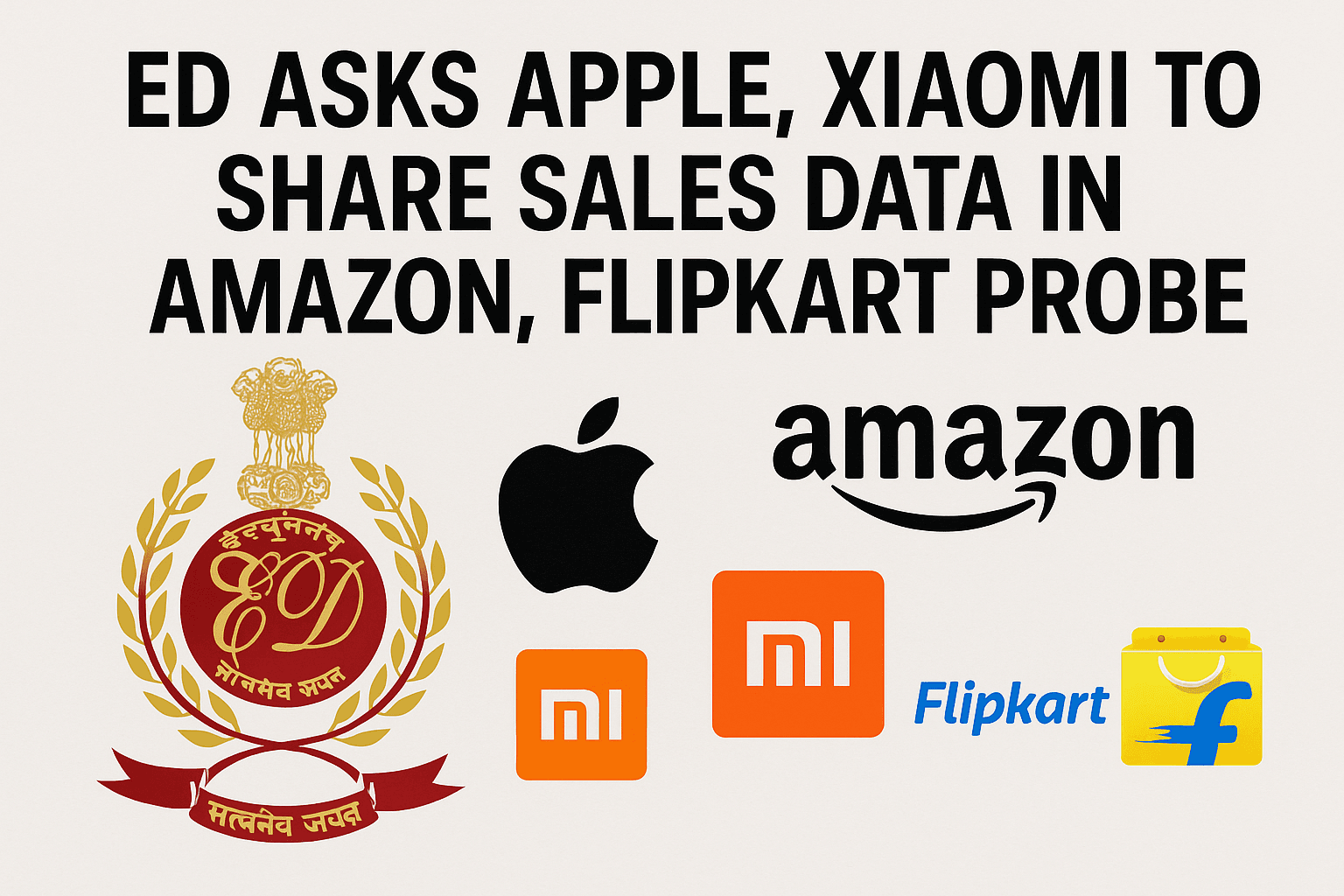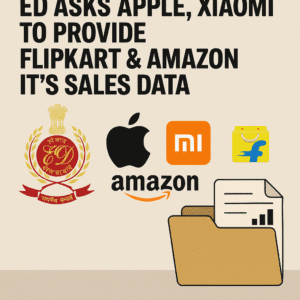
India’s booming e-commerce sector is once again under scrutiny as the Enforcement Directorate (ED) intensifies its antitrust investigation into Amazon and Flipkart. In a recent development, the financial crime agency has sought sales data and contracts from smartphone giants Apple and Xiaomi, signaling a deeper dive into alleged violations of India’s strict e-commerce laws. This probe not only highlights regulatory challenges for foreign platforms but also underscores the growing tension between India’s protectionist policies and global trade demands. Here’s a breakdown of what’s happening and why it matters.

Why Is the ED Targeting Apple and Xiaomi?
The ED’s latest move focuses on uncovering whether Amazon and Walmart-owned Flipkart violated India’s foreign direct investment (FDI) rules, which prohibit foreign-owned e-commerce platforms from controlling inventory or influencing pricing. To build its case, the agency has privately requested sales records and contractual agreements from smartphone makers like Apple and Xiaomi, whose products are top sellers on these platforms.
Key aspects under investigation include:
Exclusive Launch Deals: Whether brands like Xiaomi and Apple signed agreements to launch products exclusively on Amazon or Flipkart, sidelining smaller retailers.
Inventory Control: If the e-commerce giants indirectly managed stock for preferred sellers, bypassing FDI restrictions.
Pricing Manipulation: Evidence of platforms influencing discounts or offering preferential visibility to certain sellers.
While Apple confirmed receiving a formal ED request in March, Xiaomi’s response remains pending. Officials clarified that smartphone companies are not targets but “information sources,” hinting that penalties—if any—would fall on Amazon and Flipkart.
The Backstory: CCI’s Longstanding Battle with E-commerce Giants
This isn’t the first rodeo for Amazon and Flipkart. Since 2020, India’s Competition Commission (CCI) has probed both platforms following complaints from trader bodies like the Delhi Vyapar Mahasangh. The allegations? Promoting select sellers through unfair advantages like discounted fees, logistics support, and prime search visibility.
In 2024, the CCI concluded both platforms breached antitrust laws:
Amazon allegedly prioritized sellers like Cloudtail and Appario, which reportedly received favorable listing placements.
Flipkart was accused of enabling “predatory pricing” by subsidizing marketing and delivery costs for partners like Omnitech Retail.
The CCI’s scathing report noted, “Ordinary sellers remained as mere database entries,” emphasizing how dominant players skewed market competition. Despite legal challenges from Amazon and Flipkart, the Supreme Court greenlit the probe in 2021, leading to raids and data seizures in 2022.
India’s E-commerce Laws: A Sticking Point in US Trade Talks
The ED’s probe coincides with delicate India-US trade negotiations, where Washington has pressed New Delhi to relax its “protectionist” e-commerce policies. Current FDI rules mandate that foreign platforms like Amazon operate only as marketplaces—facilitating third-party sales without holding inventory or favoring specific vendors.
However, loopholes like the “Just in Time” (JIT) inventory model—where sellers restock based on real-time platform data—have let Amazon and Flipkart maintain indirect control. The ED found discrepancies in JIT practices, suggesting platforms may overstep their marketplace mandate.
With India’s e-retail market projected to hit $160 billion by 2028 (Bain & Co.), the US sees immense opportunity but insists on a level playing field. The ED’s findings could influence trade deal terms, balancing local business interests with foreign investment demands.
Smartphone Sales: The Heart of India’s E-commerce Boom
Smartphones are pivotal to this clash. India is the world’s second-largest mobile market, with 40% of Xiaomi and Samsung sales occurring online (Counterpoint Research, 2024). Exclusive online launches—like Xiaomi’s Redmi series or Apple’s iPhone SE—drive massive traffic to Amazon and Flipkart, often sidelining offline retailers.
This dependency on e-commerce puts brands in a tight spot. While platforms offer unmatched reach, regulatory scrutiny now demands transparency. For instance, ED’s demand for Apple’s sales data could reveal how much influence Amazon/Flipkart wield over pricing or promotions.
Big Tech in India: A Regulatory Tightrope
The probe against Amazon and Flipkart fits a broader pattern of India tightening oversight on tech giants:
Google: Fined ₹2,274 crore in 2022 for Android monopoly and Play Store policies; settled a separate Android TV case for ₹20 crore in 2024.
Meta: Penalized ₹213 crore in 2023 for WhatsApp’s privacy policy, deemed abusive to competitors.
Apple: Under CCI scrutiny for allegedly forcing developers to use its in-app payment system.
Such cases reflect India’s resolve to enforce fair competition, even as it courts foreign investment. The proposed “Digital India Act” and trader demands for a dedicated e-commerce regulator (via CAIT’s 2023 white paper) signal more reforms ahead.
What’s Next for Amazon, Flipkart, and E-commerce?
The ED’s findings could lead to hefty fines for Amazon and Flipkart, mirroring the CCI’s earlier penalties. However, the larger impact lies in policy shifts:
Stricter FDI Enforcement: Platforms may need to restructure seller agreements to avoid inventory control claims.
Level Playing Field: Smaller sellers could gain better visibility if preferential deals are banned.
Trade Deal Dynamics: India might offer limited e-commerce concessions to the US while safeguarding local businesses.
Conclusion: Balancing Growth and Fair Play
As the ED’s probe unfolds, the message is clear: India’s e-commerce market must grow without stifling competition. For global giants, compliance with local laws is non-negotiable, even as they navigate one of the world’s fastest-growing digital economies. Consumers and sellers, meanwhile, await a marketplace where innovation thrives—but not at the cost of fairness.
Stay tuned for updates on this developing story. Have thoughts on India’s e-commerce regulations? Share your comments below!









